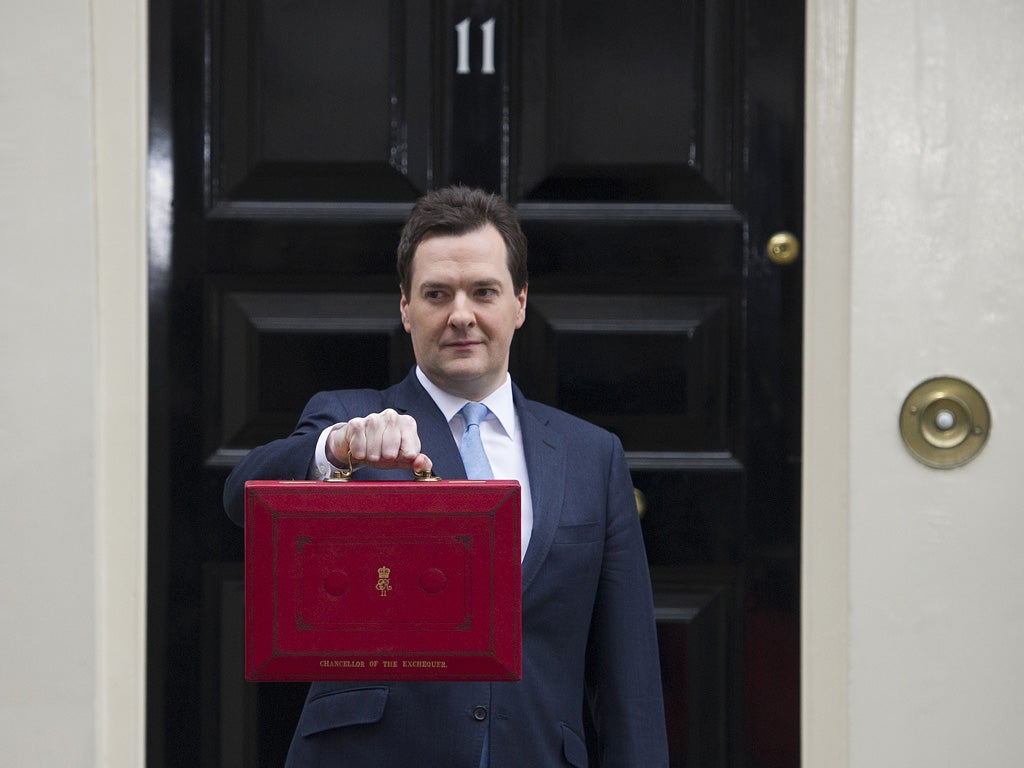Budget 2013: When wealth is flaunted, poorer people suffer
While the rich will benefit from the cut in tax, they will find it harder to evade the tax that is due


After I have analysed a Budget speech to see whether I am personally going to be better off or worse off, I next give it an equality check.
Are its measures likely to widen or reduce the gap between the haves and the have-nots? For there is much evidence that ill health and social problems occur more frequently in less equal societies. And, in turn, these unfortunate conditions directly impact on the budgets of the National Health Service and of local authorities, and the cost of maintaining law and order. So while an equality test may seem irrelevant at first glance, it is in fact an important issue.
I score George Osborne’s 2013 Budget as helpful in reducing the disparity because of a single important decision. This is what the Chancellor called “one of the largest ever packages of tax avoidance and evasion measures presented at a Budget”. To set this in context, we must see how the contours of inequality have shifted during this long recession.
The gap between the haves and the have-nots in this country first began to widen during the 1980s. This was the largest increase in income inequality seen in recent British history and was greater than the rise that took place in other countries at the same time. And as the Institute for Fiscal Studies pointed out in a recent report, inequality stabilised around this historically high level during the 1990s, creeping up slightly towards the end of that decade before falling back again during the early 2000s. It then began to increase again from 2004–05 onwards. Between 2007-09 and 2009-10, it was at its highest level since at least 1961. Then something changed.
Income inequality fell sharply in 2010–11. There were declines in real incomes, and these were smallest towards the bottom of the earnings scale and largest towards the top. The degree of inequality between high (as opposed to very high) and low incomes, and between middle and low incomes, respectively, fell by record amounts and returned to levels not seen since 1987. On the other hand – and this is where the tax avoidance measures become significant – the very rich have continued to pull away from the rest of us.
The gap between what chief executives of large groups earn and what their employees earn has gone on widening. Or, as Vince Cable, the Secretary of State for Business, put it: some of the highest paid in our largest companies see salaries and other emoluments rise virtually every year, “regardless of the performance of the economy, the stock market or even the company in question”. At the same time, sports and entertainment stars, hedge-fund managers and the beneficiaries of inherited wealth follow the same trajectory.
Does it matter if a very small number of people earn ridiculously high salaries? I think it does because blatant inequality is widely visible though the press, broadcasting and social media. We are not a society in which the rich try to hide their wealth. They flaunt it and, as they do, they exacerbate the stress that some people feel at their supposed low social status. These people become more anxious.
The lucky few are, of course, often adept at reducing their tax bills through a variety of schemes marketed by investment banks. But this time, the Government’s response looks serious. Agreements with the Isle of Man, Guernsey, and Jersey are expected to bring in more than a billion pounds in unpaid taxes. Some £2bn should be gained from new rules to stop the abuse of partnership rules, corporate tax losses and offshore employment intermediaries. And the promoters of tax avoidance schemes are to be named and shamed. Very good.
So while the rich will benefit from the cut in the top rate of tax from 50 per cent to 45 per cent that shortly comes into effect, they will find it harder to evade the tax that is due. From the point of view of equality, this package seems to me to be a marked improvement on the former arrangement – a high marginal rate of tax coupled with widespread, easy-to-arrange tax dodging.
Meanwhile, the forces driving a wedge between the rich and poor are strengthening, originating as they do from technological progress and globalisation. While in the past, breakthroughs in automation that eliminated jobs in one activity were balanced out by the creation of jobs in new industries – former farm labourers ended up in factories – this is no longer the case. For the computer is a more pervasive technological advance than even the steam engine, the electric motor and the internal combustion engine. And developments in digital technologies arrive much more frequently than did improvements in the earlier inventions. When Ford made cheap motor cars, factories employing thousands of workers were required to meet the demand. When Apple brings out a new must-have device, how much employment is created? The answer is very little in the industrialised West because the work is outsourced to China.
So one of the tasks of economic and fiscal policy – and of the annual Budget statements that bring everything together – is to soften the impact of these unstoppable forces on ordinary men and women, who find their wages rising very slowly, well below the rate of inflation. That is, if they manage to keep their jobs.
a.whittamsmith@independent.co.uk
Join our commenting forum
Join thought-provoking conversations, follow other Independent readers and see their replies
Comments
Bookmark popover
Removed from bookmarks